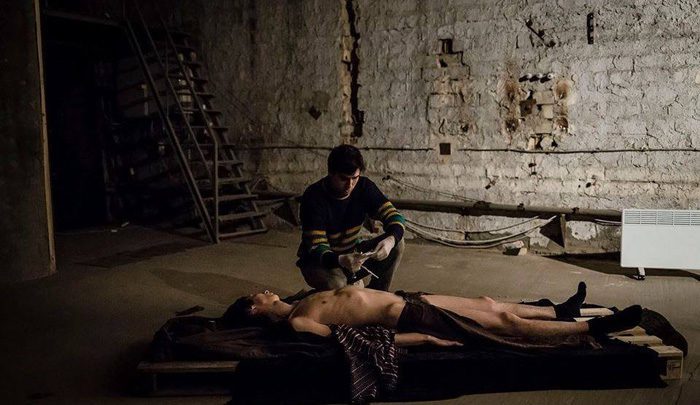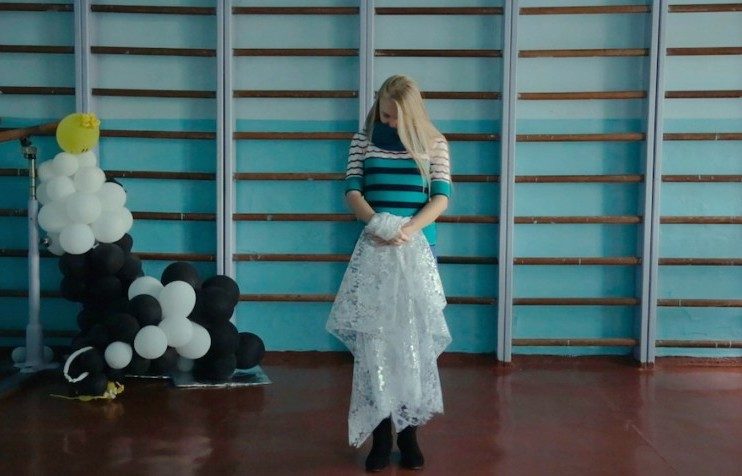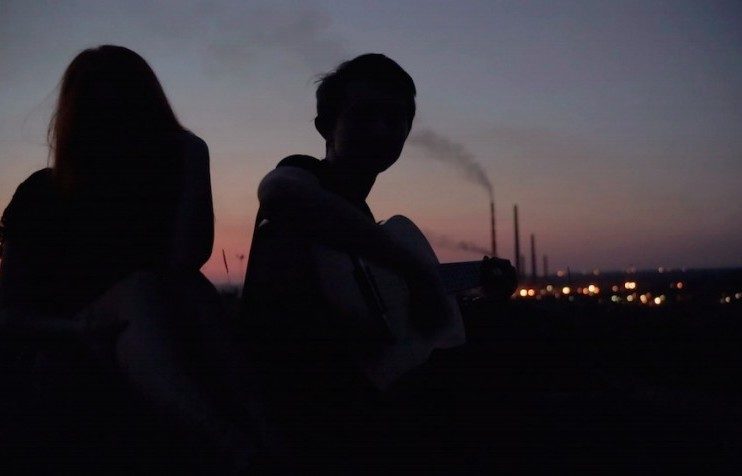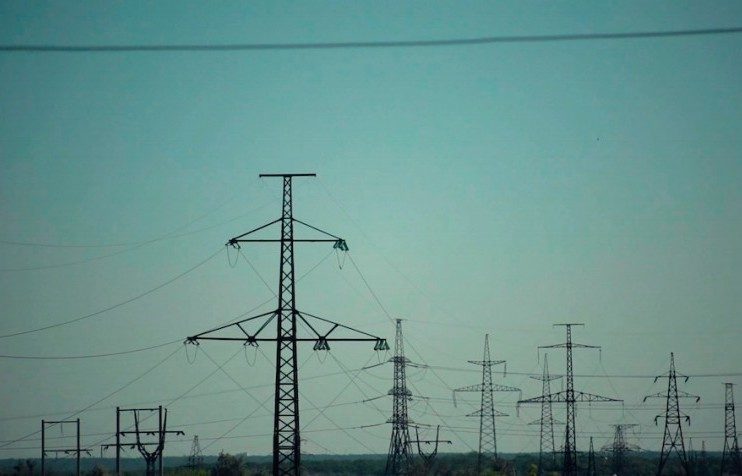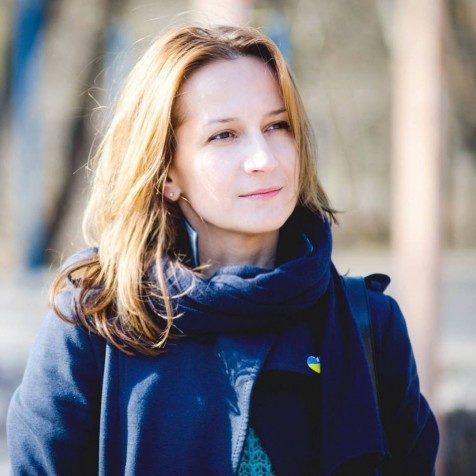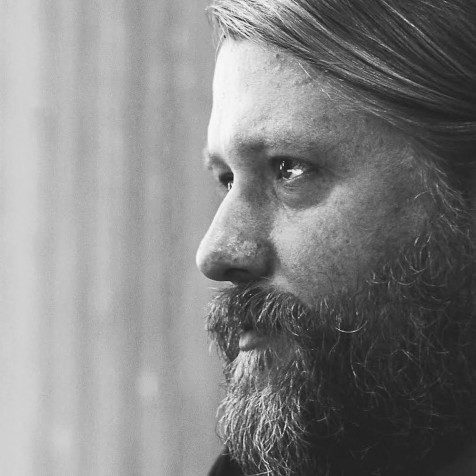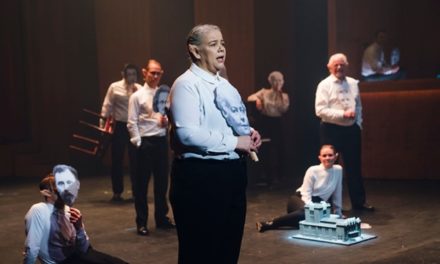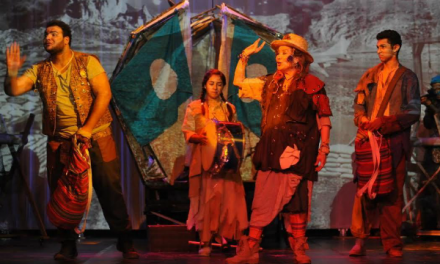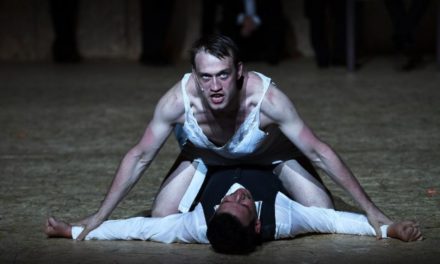School #3, a documentary about everyday life in war-struck eastern Ukraine, recently won a Grand Prix at the Berlinale film festival. For those involved, the process opens new paths of communication and understanding between the people at the heart of the country’s current military conflict. Molly Flynn asks how an independent group of filmmakers and theatre artists learned to listen to the Donbass.
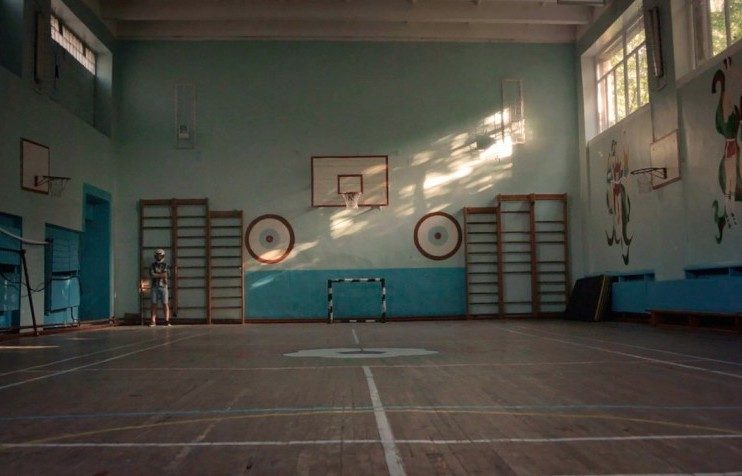
Still from School #3 (2017), dir. by Liza Smith and George Genoux. Image: Khrystyna Lizogub courtesy of Tabor Productions
Living in Mykolaivka is like living on Mars. At least that’s how it’s described by one of the teenage protagonists at the center of new Ukrainian documentary School #3. The film, which was just awarded the Grand Prix in the Generation category at the 67th Berlinale Film Festival, follows 13 teenagers who speak candidly about their experiences growing up in Donbass. “We don’t know anything about the world except what we see on the internet. To see something online isn’t the same as seeing it with your own eyes,” one says. Set against the bleak beauty of Mykolaivka’s post-Soviet landscape, the film’s protagonists speak directly to the camera, recounting personal stories of love, loss, and life after the war.
In summer 2014, conflict erupted in this small city in the Donetsk region as the Ukrainian army clashed with Russian-backed separatists seeking to expand their control of the area. After four days of heavy shelling, Mykolaivka was secured by Ukrainian forces and the separatists began to retreat. Some of the stories told in School #3 recall the details of those four days in July 2014 when the city was caught between two opposing forces. Other narratives in the film show the lingering effects of war on the speakers’ day-to-day lives. Many of the young heroes in the film cast the war as peripheral, sharing instead intimate details about their dreams for the future and regrets about the past.
Co-directed by Ukrainian filmmaker Liza Smith and German theatre director Georg Genoux and co-produced by Tabor Productions, School #3 was developed in parallel with a live theatre performance entitled My Mykolaivka. The autumn after the shelling, a group of volunteers from the organization New Donbass visited Mykolaivka to help rebuild the city’s infrastructure. Among them were Genoux and Ukrainian playwright Natalia Vorozhbyt. The two theatre-makers went on to create My Mykolaivka together with the students, a production which has since toured to Lviv and to Konstanz, Germany.
Following their work in Mykolaivka, Vorozhbyt and Genoux founded the Kiev-based artists’ collective Theatre of Displaced People in 2015. Since that time, the group has produced dozens of performance projects in which internally displaced people, soldiers, children, journalists, and activists recite their own stories onstage. The striking sincerity of the monologs featured in School # 3 is indicative of the stripped-down style seen in all Theatre of Displaced People projects, purposefully built to cross-cultural divisions and create space for healing and reconciliation.
It is more important than ever for artists and activists to create spaces in which the people whose lives have been touched by war are able to tell their stories and to know that someone is listening.
At one point in the film, 14-year-old Vladislav Shokin stands at the front of an empty classroom in the local school, which was partially destroyed during the shelling. Surrounded by the familiar blue-green hues characteristic of schoolrooms across former Soviet countries, Vladislav speaks to the camera as if to a friend. He recalls the time he discovered a small bug in a bunch of grapes and carried it in his hands to the window so it could fly away. “I don’t know why,” he says, “I just didn’t want to kill it. And that made me think, how could I kill a person if I can’t even kill a bug? I’ve stopped asking myself questions like that. I don’t think about the war anymore.”
- Katya Sergeeva in a still from School # 3 (2017). Image: Khrystyna Lizogub
The ongoing armed conflict in Donbass has claimed close to 10,000 lives since fighting began in spring 2014. It has led to the internal displacement of almost two million people. Propaganda and disinformation about the war are disseminated on both sides of the front line, leading to increased resentment and violence across the region. At a moment of extreme uncertainty for Ukraine particularly and Eastern Europe more broadly, it is more important than ever for artists and activists to create spaces in which the people whose lives have been touched by war are able to tell their stories and to know that someone is listening.
The reciprocal act of both speaking and hearing such stories is essential to the efficacy of School # 3 and the Theatre of Displaced People. By inviting individuals to share their stories, the group engages participants in an important process of self-definition. The practice of speaking and listening offers new agency to those involved. Participants gain the opportunity to tell their own stories and defy common stereotypes of Ukrainian speaking Euro-enthusiasts versus Russian-speaking Soviet loyalists. In this way, the protagonists of School # 3 learn to see themselves and each other as individuals.
- Vika Gorodinskaya and Ruslan Ivanov in a still from School # 3 (2017). Image: Khrystyna Lizogub
- Outside Mykolaivka. Image: Khrystyna Lizogub
In a related project entitled Children and Soldiers, the Theatre of Displaced People invited teenagers from four frontline cities to collaborate on a live performance with soldiers, many of whom had been stationed in these cities for close to three years. In previous visits to the eastern cities of Popasna, Shchastya, Slaviansk and Mykolaivka, the theatre’s directors noticed that local residents were often afraid of the soldiers who were living in their towns and many of the soldiers suspected the locals of being separatist sympathizers. Working together with professional playwrights and directors, the soldiers and students created a documentary play in which they recounted their experiences of the war and performed their stories for the public at the end of the week.
The voices in the film are quiet, honest and subjective.
Natalia Vorozhbyt recalls one of the soldiers in Popasna, who told the group how he used to look across at the block of flats opposite his checkpoint. He noticed that the light was always on in one window on the ninth floor. He was sure someone inside was watching him with binoculars. Since his work with the Theatre of Displaced People, however, this soldier has learned that that ninth floor window belongs to Lyosha from the school. The window below is Marina’s. Such a statement of recognition and personal connection speaks directly to the impact of the Theatre.
- Playwright Natalia Vorozhbyt
- Director Georg Genoux. Image: Oleksandra Zheleznova
Soon after the war in eastern Ukraine began in spring 2014, local oligarch and so-called “owner of the Donbass”, Rinat Akhmetov, famously appealed to the government and to the Ukrainian people to “listen to the voices of the Donbass.” Akhmetov’s proclamation can hardly be interpreted as advocacy for the multi-lingual and multi-ethnic population of Ukraine’s eastern regions. Rather, as journalist Oksana Forostyna writes, the oligarch’s formulation can be understood as the “cry of a feudal lord to a band of rebels.” In an article on the topic, Forostyna goes on to ask: “How can we listen to the Donbass when the loudest voices in the room belong to the elites, to the clans, to people who can set the agenda?”
School #3 and the work of the Theatre of Displaced People represents an attempt to answer precisely this question. The voices in the film are quiet, honest and subjective. By collecting these stories and making sure they are heard, the artists behind the film offer international audiences the opportunity to bear witness to Ukraine’s current crisis. The film features the kinds of narratives not often heard in mainstream media and depicts the most personal effects of war. In this way, Theatre of Displaced People works not only on the frontlines of Ukraine’s cultural division but also at the forefront of arts activism in the 21st century.
This article was first published on The Calvert Journal on March 29th, 2017. Reposted with permission of the author. Read the original article here.
This post was written by the author in their personal capacity.The opinions expressed in this article are the author’s own and do not reflect the view of The Theatre Times, their staff or collaborators.
This post was written by Molly Flynn.
The views expressed here belong to the author and do not necessarily reflect our views and opinions.

